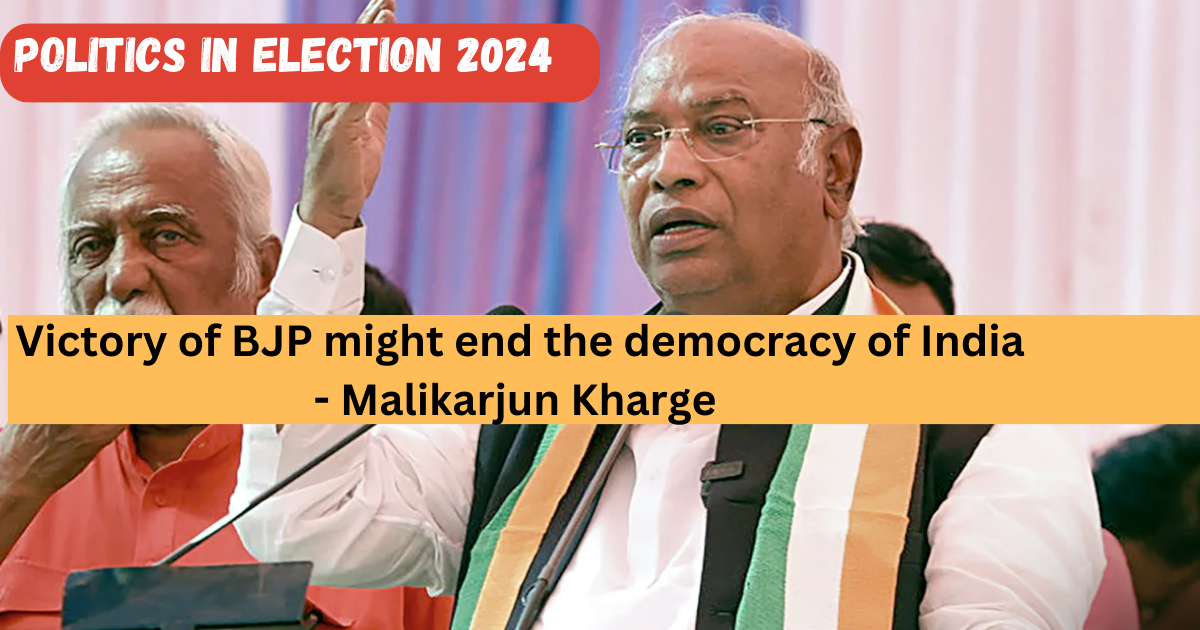Election 2024 politics: Kharge states BJP’s victory might end the democracy in India.
Introduction:
In a recent rally, Mallikarjun Kharge, Congress president and convenor of the INDIA bloc, delivered a strong message to the citizens of India. He warned that the 2024 Lok Sabha elections could mark a crucial juncture for the nation’s democracy, suggesting that a victory for Prime Minister Narendra Modi’s party in election 2024 might pave the way for dictatorship. Kharge’s remarks escalating political tensions and concerns over the erosion of democratic principles in India due to people’s vote to Modi Govt.

The Threat of Dictatorship:
Kharge did not mince his words when he likened the Bharatiya Janata Party (BJP) and its ideological ally, the Rashtriya Swayamsevak Sangh (RSS), to poison for democracy. He cautioned that another term for Modi could lead to authoritarian rule similar to that we see under Vladimir Putin in Russia. Kharge’s warning underscores the gravity of the situation, highlighting the potential consequences of unchecked power in the hands of a single political entity.
Erosion of Democratic Norms:
The Congress president’s address shed light on the alleged tactics employed by the ruling government to stifle dissent and consolidate power. He accused the Modi administration of using state machinery to intimidate opposition leaders, citing instances of legal harassment and political coercion. Kharge’s portrayal of a government resorting to tactics reminiscent of autocratic regimes raises pertinent questions about the state of democracy in India today.
Challenges to National Unity:
Kharge’s critique extended beyond domestic politics to encompass issues of national security and unity. He expressed the disappointment on the failure of ruling Govt. to address the ongoing violence in states like Manipur and Nagaland, and asked the reason for his absence in affected areas. Kharge invoked the legacies of former Prime Ministers Indira Gandhi and Rajiv Gandhi, emphasizing their sacrifices in the service of the nation and contrasting them with what he sees as the current leadership’s shortcomings.
Electoral Dynamics and Opposition Resilience:
Despite recent setbacks such as Bihar Chief Minister Nitish Kumar’s return to the BJP-led National Democratic Alliance (NDA), Kharge remained resolute in his party’s electoral prospects. He expressed confidence in the opposition’s ability to overcome such challenges and deliver a decisive blow to the ruling BJP in the upcoming polls. Kharge’s statement reflect a strong opposition and will to defeat the ruling party.
Conclusion:
Mallikarjun Kharge’s impassioned address serves as a stark reminder of the high stakes involved in India’s democratic journey. His warnings about the specter of dictatorship, erosion of democratic norms, and challenges to national unity underscore the need for vigilant citizenship and robust institutional safeguards. As the country braces itself for yet another electoral showdown, Kharge’s words resonate as a clarion call to defend and uphold the foundational principles of Indian democracy.


